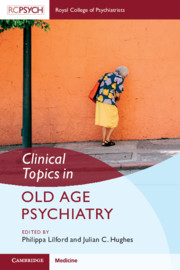Book contents
- Clinical Topics in Old Age Psychiatry
- ‘Clinical Topics In … ’
- Clinical Topics in Old Age Psychiatry
- Copyright page
- Dedication
- Contents
- Contributors
- Preface
- Acknowledgement
- Editors’ Note
- Abbreviations
- Introductory Comments
- Section 1 Epidemiology and Types of Disorders
- Chapter 1 Epidemiology and Mental Health in Old Age
- Chapter 2 Vascular Dementia
- Chapter 3 Young-Onset Dementias
- Chapter 4 Rare and Unusual Dementias
- Chapter 5 Mania in Late Life
- Chapter 6 Alcohol Misuse in Older People
- Chapter 7 Drug Misuse in Older People
- Chapter 8 Mental Health in Parkinson’s Disease
- Section 2 Assessment and Investigations
- Section 3 Approaches to Management
- Section 4 Law, Ethics, and Philosophy
- Index
- References
Chapter 4 - Rare and Unusual Dementias
from Section 1 - Epidemiology and Types of Disorders
Published online by Cambridge University Press: 12 September 2020
- Clinical Topics in Old Age Psychiatry
- ‘Clinical Topics In … ’
- Clinical Topics in Old Age Psychiatry
- Copyright page
- Dedication
- Contents
- Contributors
- Preface
- Acknowledgement
- Editors’ Note
- Abbreviations
- Introductory Comments
- Section 1 Epidemiology and Types of Disorders
- Chapter 1 Epidemiology and Mental Health in Old Age
- Chapter 2 Vascular Dementia
- Chapter 3 Young-Onset Dementias
- Chapter 4 Rare and Unusual Dementias
- Chapter 5 Mania in Late Life
- Chapter 6 Alcohol Misuse in Older People
- Chapter 7 Drug Misuse in Older People
- Chapter 8 Mental Health in Parkinson’s Disease
- Section 2 Assessment and Investigations
- Section 3 Approaches to Management
- Section 4 Law, Ethics, and Philosophy
- Index
- References
Summary
Over 95% of cases of dementia are attributable to Alzheimer’s disease (AD), vascular dementia (VaD), dementia Lewy body (DLB), and frontotemporal dementia (FTD), as well as mixed Alzheimer’s and VaD, and so on. In this chapter we consider some of the rare and unusual causes that account for the remaining 5%. Categorizing them according to aetiological group (degenerative, vascular, and infectious causes, including human prion diseases), we discuss the presentation of these forms and reasons for variations in estimated prevalence rates in the general population. We shall then go on to describe toxic, iatrogenic, nutritional, traumatic, metabolic, neoplastic, and autoimmune causes of dementia. Disorders are graded according to their prevalence, to give an idea of the likelihood of their presentation. Guidance is given on the investigation of uncommon cognitive impairment and dementia. We have tried to avoid repeating information available in the Chapter 3 on the causes of young-onset dementias, but inevitably there is some overlap of material.
- Type
- Chapter
- Information
- Clinical Topics in Old Age Psychiatry , pp. 50 - 77Publisher: Cambridge University PressPrint publication year: 2020

